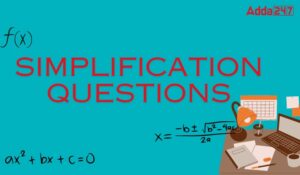Dear Students,
Quantitative Aptitude Questions for IBPS Exam
Today we have included Data Interpretation and Arithmetic Questions. You should try to solve these set of questions within 17-18 minutes If you fail to complete it in the stipulated time, then try again with full force. These quantitative aptitude questions are very important from exam point of view like IBPS RRB Exam, IBPS PO and IBPS Clerk.
Q1. Rajni purchased a mobile phone and a refrigerator for Rs 12,000 and Rs 10,000 respectively. She sold the refrigerator at a loss of 12 percent and mobile phone at a profit of 8 percent. What is her overall loss/profit?
(a) Loss of Rs 280
(b) Profit of Rs 2,160
(c) Loss of Rs 240
(d) Profit of Rs 2,060
(e) None of these
Q2. A man sold a wristwatch for Rs 2400 at a loss of twenty-five percent. At what rate should he have sold the wristwatch to earn a profit of twenty-five percent?
(a) Rs 3,600
(b) Rs 4,000
(c) Rs 3,500
(d) Rs 3,800
(e) None of these
Q3. Rehaan purchased a bike for Rs 54,000. He sold it at a loss of 8 percent. With that money, he again purchased another bike and sold it at a profit of 10 per cent. What is his overall loss/profit?
(a) Loss of 657
(b) Profit of 567
(c) Loss of 648
(d) Profit of Rs 648
(e) None of these
Q4. A merchant buys two items for Rs 7500. One item he sells at a profit of 16% and the other item at 14% loss. In the deal, the merchant makes neither any profit nor any loss. What is the difference between the selling price of both the items? (in rupees)
(a) 625
(b) 610
(c) 500
(d) 630
(e) 615
Q5. The profit earned after selling an article for Rs 1,516 is the same as the loss incurred after selling the article for Rs 1,112. What is the cost price of the article?
(a) Rs 1,314
(b) Rs 11,343
(c) Rs 1,414
(d) Rs 1,434
(e) None of these
Q6. Ravi borrowed some money at the rate of 4 p.c.p.a for the first three years, at the rate of 8 p.c.p.a for the next two years and at the rate of 9 p.c.p.a for the period beyond 5 years. If he pays a total simple interest of Rs 19550 at the end of 7 years, how much money did he borrow?
(a) Rs 39500
(b) Rs 42500
(c) Rs 41900
(d) Rs 43000
(e) None of these
Q7. A sum of Rs 2200 is invested at two different rates of interest. The difference between the interests got after 4 years in Rs 202.40 What is the difference between the rates of interest?
(a) 3.3%
(b) 2.3%
(c) 3.5%
(d) 2.5%
(e) None of these
Q8. A sum of Rs 16800 is divided into two parts. One part is lent at the simple interest of 6% per annum and the other at 8% per annum. After 2 years total sum received is Rs 19000. The sum lent at 6% of simple interest is
(a) Rs 12200
(b) Rs 12000
(c) Rs 11000
(d) Rs 10000
(e) None of these
Q9. A discount of 15% is given on the marked price of an article. The shopkeeper charges sales tax of 6% on the discounted price. If the selling price be Rs 1081.20, what is the marked price of the article?
(a) Rs 1185.20
(b) Rs 1250.20
(c) Rs 302
(d) Rs 1200
(e) None of these
Q10. While selling a watch, a shopkeeper gives a discount of 15%. If he gives a discount of 20%, he earns Rs 51 less as profit. What is the original price of the watch?
(a) Rs 920
(b) Rs 985
(c) Rs 1125
(d) Rs 1020
(e) None of these
Directions (11-15): in the following line graph, the production of cars by three different companies is given in six different years. Study the graph carefully and answer the related questions.
Q11. What is the approximate percentage increase in production of cars by company B in 2005 than the previous year?
(a) 50.5%
(b) 45.45%
(c) 55%
(d) 40%
(e) None of these
Q12. Find the difference between average production of cars by company A and that of company C through out all the years.
(a) 5 lakhs
(b) 5.4 lakhs
(c) 4.6 lakhs
(d) 6.6 lakhs
(e) None of these
Q13. Production of cars made by company A in 2002 and 2003 together is what percent of total cars made by company B over all the years? (approximately)
(a) 35%
(b) 33%
(c) 28%
(d) 26%
(e) None of these
Q14. Find the ratio of cars produced by company-C in years 2002 and 2005 together to that of the cars produced by company-B in the years 2004 and 2006 together.
(a) 21: 23
(b) 27: 29
(c) 29: 23
(d) 23: 29
(e) None of these
Q15. If the production of cars by company-A increases by 10% in 2007 than the previous year, then find the new average production of cars by company –A over all the years including the year 2007.
(a) 32.5 lakhs
(b) 35 lakhs
(c) 28.5 lakhs
(d) 30.5 lakhs
(e) None of these





 Simplification Questions For Bank Exams ...
Simplification Questions For Bank Exams ...
 Quantity Comparison Questions for Bank E...
Quantity Comparison Questions for Bank E...
 Mixture & Alligation Questions for B...
Mixture & Alligation Questions for B...





